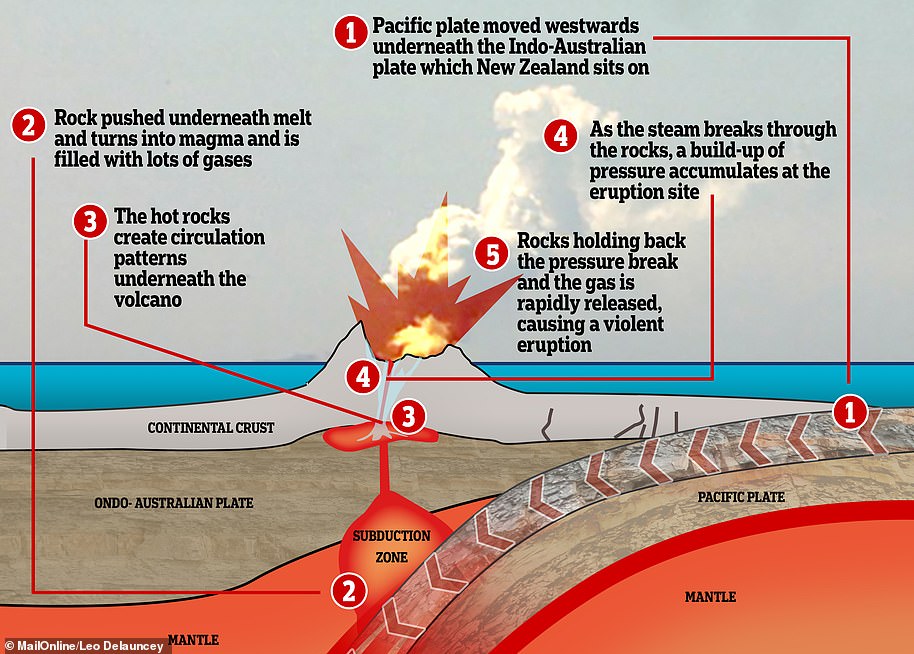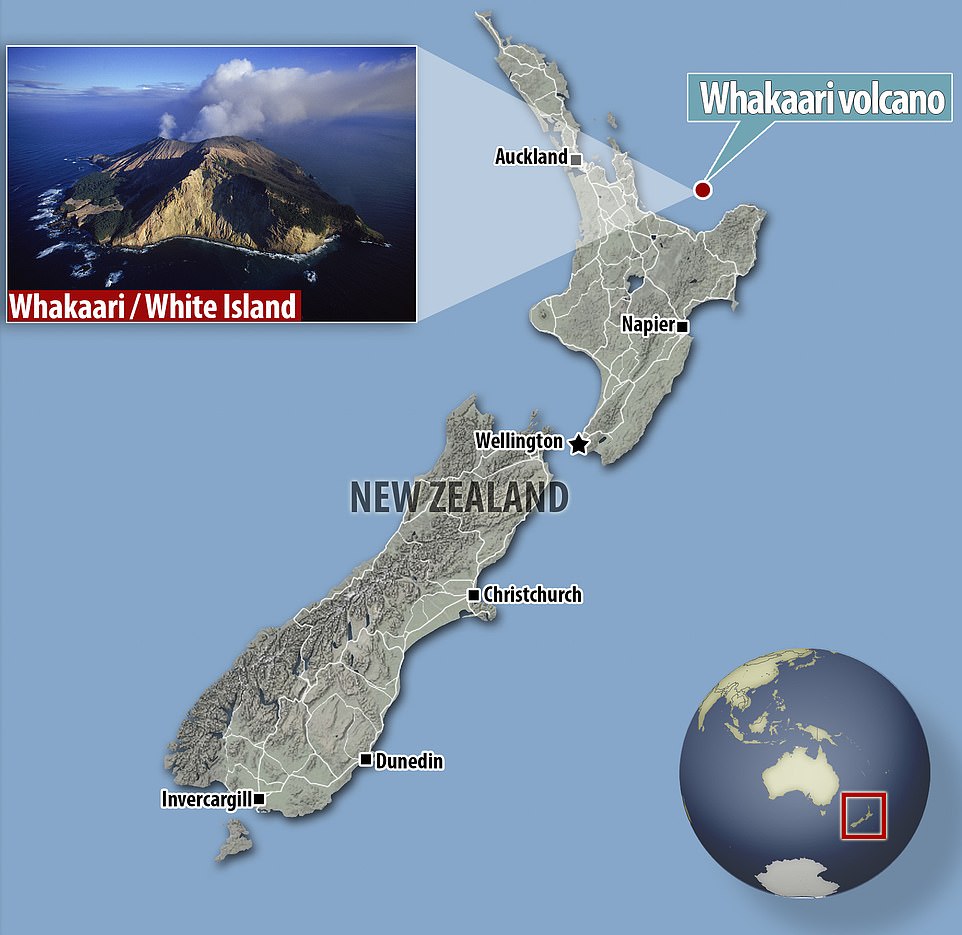World #1 – ‘No signs of life’ on New Zealand volcano island after eruption
Daily News Article — Posted on December 10, 2019
(by Charlotte Greenfield, Reuters) WHAKATANE, New Zealand, Dec 9 UPDATE 1 — New Zealand said on Tuesday that eight people were missing, presumed dead, a day after a volcano unexpectedly erupted off the coast of New Zealand’s North Island, killing at least five people and injuring more than 30.
Prime Minister Jacinda Ardern told reporters in Whakatane, a town near the volcanic uninhabited White Island tourist attraction, that aerial reconnaissance flights had shown no signs of life.
“It’s now clear that there were two groups on the island – those who were able to be evacuated and those who were close to the eruption,” Ardern told reporters.
New Zealanders and tourists from Australia, the United States, Britain, China and Malaysia were among the missing and injured, she said, adding that there were two explosions in quick succession. No further details were given. …
Waikato Police Superintendent Bruce Bird said 47 people visited the island [were on the island when the volcano erupted?] on Monday – five were confirmed to have been killed and eight were missing. Some 31 were in hospital and three had been discharged.
Police said they did not expect to find any more survivors from the eruption, which spewed a plume of ash thousands of feet into the air. Many of the injured were in critical condition, most from burns, Ardern said.
White Island is about 30 miles from the east coast of North Island and huge plumes were visible from the mainland. Volcanologists said the ash plume shot 12,000 feet into the air.
“White Island has been a disaster waiting to happen for many years,” said Ray Cas, a professor emeritus at Monash University, in comments published by the Australian Science Media Centre.
“Having visited it twice, I have always felt that it was too dangerous to allow the daily tour groups that visit the uninhabited island volcano by boat and helicopter.”
Supt. Bird said rescue services were working to return to the island and were relying on advice from scientific and technical experts meeting in Wellington on Monday.
“We will only go to the island if it is safe for our people,” Bird said. “We will be relying on advice coming from the scientific and technical committee in Wellington who are currently meeting at the moment and hope to hear further advice on when we may potentially return to the island.”
Many day tours visit the island regularly. One from a 16-deck cruise liner, Ovation of the Seas, was there at the time.
Ardern said helicopters made a deliberate decision to fly to the island to rescue survivors immediately after the eruption.
[Following the immediate rescue, emergency response teams were unable to land on to the island due to fears of landslides and further eruptions. A New Zealand naval ship anchored near the shore and deployed drones and ‘observational equipment’ to scour the island. In addition, seven helicopters were dispatched to the island, but they were unable to land. They did not detect any signs of life.].“I want to acknowledge the courageous decision made by first responders and those pilots who in the immediate rescue effort made an incredibly brave decision under extraordinarily dangerous circumstances in an attempt to get people out,” Ardern said.
“As a result of their efforts a number of people were rescued from the island.”
…A crater rim camera owned and operated by New Zealand science agency GeoNet [which monitors geological hazards] showed groups of people walking toward and away from the rim inside the crater, from which white vapour constantly billows, in the hour leading up to the eruption.
Michael Schade, an engineering manager from San Francisco, was one of the tourists who made it off the island just before the eruption.
“This is so hard to believe,” Schade said in a video posted on Twitter as he sped away from the island by boat. “Our whole tour group were literally standing at the edge of the main crater not 30 minutes before.”
“We had just got on the boat… then someone pointed it out and we saw it,” he said. “I was basically just shocked. The boat turned back and we grabbed some people that were waiting on the pier.”
GeoNet raised the alert level for the White Island volcano in November due to an increase in volcanic activity.
The volcano’s last fatal eruption was in 1914, when it killed 12 sulphur miners. There was a short-lived eruption in April 2016. Daily tours allow more than 10,000 people to visit the volcano every year.
White Island – ‘Whakaari’, as it is known in the Maori language, is New Zealand’s most active cone volcano…. About 70 percent is under the sea, making the massive volcanic structure the largest in New Zealand.

The violent volcanic eruption on New Zealand’s White Island was caused because ocean crust is being subducted (pictured, the series of events leading to the spontaneous eruption). This constant movement means sudden explosions can occur at any moment. Image from UK Daily Mail.
(Additionial reporting by Barbara Goldberg; Writing by Praveen Menon; Editing by Mark Heinrich and Nick Macfie)
Published by Reuters .com on December 9, 2019. Reprinted here for educational purposes only. May not be reproduced on other websites without permission from Thomson Reuters.
Background
Why are tourists allowed on the island?
The island, also known as Whakaari, is privately owned and is typically visited by thousands of tourists every year, despite the fact that it has been erupting in some form since 2011.
Geological hazard monitors GeoNet pass on information about the volcano's activity to tour operators and the police, but tourists make their own decisions about whether to visit.
Visitors are supplied with hard hats and gas masks to protect against sulphurous steam and must have suitable footwear to make the tour...
The owners of Whakatane-based company White Island Tours are the official guardians of the island, which was declared a private scenic reserve in 1952, and they grant access through designated tour operators.
According to the New Zealand Herald, White Island Tours warned on its website that visitors "should be aware that there is always a risk of eruptive activity regardless of the alert level," while stating it followed a "comprehensive safety plan which determines" its activities on the island "at the various levels." (from a Dec. 9 BBC report)

